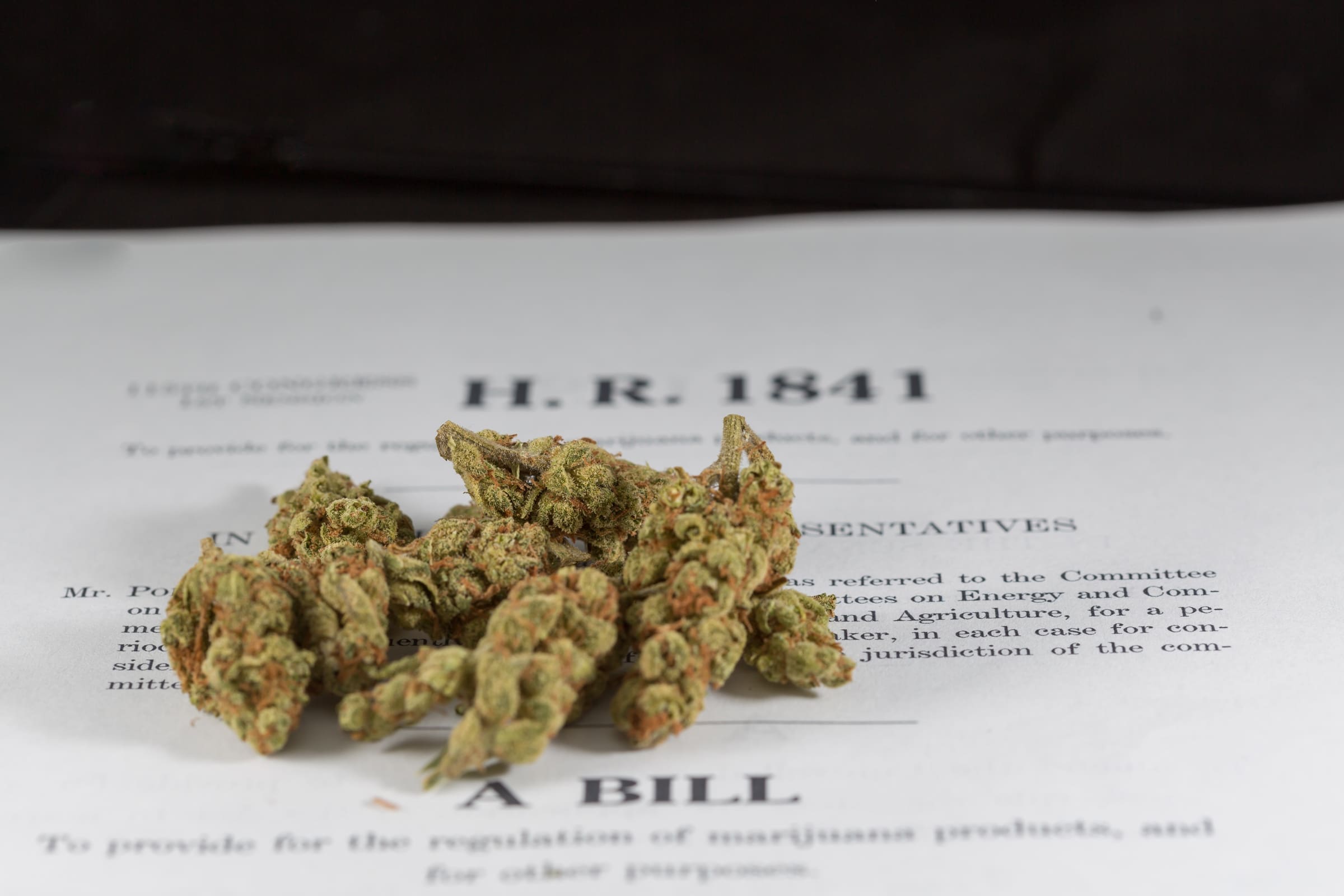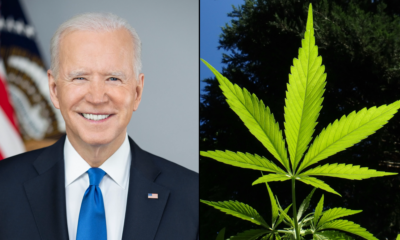Politics
Top Congressional Chairman And Presidential Candidate File Marijuana Legalization Bills

The chairman of a key congressional committee responsible for crime policy is teaming up with a senator running for president to file legislation on Tuesday that would federally legalize marijuana and seek to repair some of the harms of a war on drugs that has been waged primarily against people of color.
The move by Rep. Jerrold Nadler (D-NY), who leads the Judiciary Committee, and 2020 Democratic contender Sen. Kamala Harris (D-CA) signals that, at least on the House side of Capitol Hill, a floor vote to end federal cannabis prohibition could come before the end of the year.
If enacted, the Marijuana Opportunity Reinvestment and Expungement (MORE) Act would remove marijuana and THC from the Controlled Substances Act, provide for expungement and resentencing of prior convictions and prevent federal agencies from using cannabis as a reason to deny access to benefits or citizenship status for immigrants.
It would also impose a five percent federal tax on the sales of marijuana products. Some of that revenue would be directed toward a new Opportunity Trust Fund aimed at supporting grant programs to provide job training and legal aid for people impacted by prohibition enforcement, loans for small marijuana businesses owned and controlled by socially and economically disadvantaged individuals and efforts to minimize barriers to licensing and employment in the legal industry. Some of these efforts would be run through a new Cannabis Justice Office in the Department of Justice.
The far-reaching legislation was filed on the same day that a Senate committee is scheduled to hold a highly anticipated hearing on banking access by marijuana businesses, indicating that federal cannabis reform has increased momentum on both sides of Capitol Hill.
It also comes as Nadler prepares for an unrelated high-stakes Judiciary Committee hearing on Wednesday with Robert Mueller, the former special counsel, about his investigation into Russia’s interference with the 2016 election and President Donald Trump’s conduct.
“Despite the legalization of marijuana in states across the country, those with criminal convictions for marijuana still face second class citizenship. Their vote, access to education, employment and housing are all negatively impacted,” Nadler said. “Racially motivated enforcement of marijuana laws has disproportionally impacted communities of color. It’s past time to right this wrong nationwide and work to view marijuana use as an issue of personal choice and public health, not criminal behavior.”
Proud to introduce the Marijuana Opportunity Reinvestment and Expungement Act w/ @SenKamalaHarris to decriminalize marijuana at the federal level and bring justice to communities that have been disproportionately harmed by the war on drugs. https://t.co/VoGuDxlbKc
— (((Rep. Nadler))) (@RepJerryNadler) July 23, 2019
The panel’s Crime, Terrorism and Homeland Security Subcommittee held a hearing earlier this month focused on the issue of ending cannabis prohibition. While lawmakers from both parties voiced broad support for some measure of marijuana reform, there was disagreement on specific components of would-be legalization plans—with significant contention over whether restorative justice and equity measures must be included. A look at the new bill’s provisions indicates that Democratic leadership believes simply legalizing marijuana is not enough.
The legislation from Nadler and Harris includes language making provisions that deschedule marijuana retroactive and also specifies that federal agencies “may not use past or present cannabis or marijuana use as criteria for granting, denying, or rescinding a security clearance.”
The bill would require that any uses of the words “marijuana” or “marihuana” in U.S. Code or regulations be replaced with the term “cannabis”—despite the fact that the legislation has “marijuana” in its own title.
Original cosponsors of Harris’s Senate bill include Sens. Cory Booker (D-NJ) and Elizabeth Warren (D-MA)—two of her rivals for the Democratic presidential nomination—as well as Sens. Jeff Merkley (D-OR) and Ron Wyden (D-OR).
Signing onto the House version are Rules Committee Chair James McGovern (D-MA) and Small Business Committee Chair Nydia Velazquez (D-NY).
Rep. Matt Gaetz (R-FL) is the sole Republican cosponsor, and is joined by Reps. Barbara Lee (D-CA), Earl Blumenauer (D-OR), Hakeem Jeffries (D-NY), David Cicilline (D-RI), Steve Cohen (D-TN), Lou Correa (D-CA), Madeleine Dean (D-PA), Ted Deutch (D-FL), Veronica Escobar (D-TX), Sheila Jackson Lee (D-TX), Pramila Jayapal (D-WA), Hank Johnson (D-GA), Ted Lieu (D-CA), Zoe Lofgren (D-CA), Jamie Raskin (D-MA), Eric Swalwell (D-CA), Dwight Evans (D-PA), Tulsi Gabbard (D-HI), Debra A. Haaland (D-NM), Ro Khanna (D-CA), Eleanor Holmes Norton (D-DC), Ayanna Pressley (D-MA), Maxine Waters (D-CA) and Bonnie Watson Coleman (D-NJ).
Proud to cosponsor @RepJerryNadler & @SenKamalaHarris’s Marijuana Opportunity Act. It will
✅Decriminalize marijuana
✅Expunge marijuana convictions
✅Create economic opportunities for communitiesThis is the most comprehensive cannabis reform bill to ever come before Congress!
— Rep. Lou Correa (@RepLouCorrea) July 23, 2019
The #MOREAct would legalize #marijuana, require resentencing and expungement of old marijuana convictions, and invest money in communities most affected by the failed War on Drugs. This is real reform. I’m proud to be an original cosponsor of the bill. #LegalizeIt #Cannabis https://t.co/luzZUCzLXg
— Steve Cohen (@RepCohen) July 23, 2019
Numerous alternate proposals to overhaul federal cannabis laws have already been filed during the 116th Congress, but that the new bill displays the House Judiciary Committee chairman’s name as its chief sponsor suggests it will likely be the vehicle through which the chamber considers ending prohibition in any votes over the coming months.
That said, the legislation as introduced may well see large and small revisions during an as yet unscheduled committee markup session, or later on the floor. And it is possible that provisions from other existing proposals could be merged in to achieve greater support for the bill when it comes time for a vote.
The new measure and others that have previously been filed with social equity components are largely cosponsored by Democrats—in most cases with zero Republicans on board.
A different approach, the Strengthening the Tenth Amendment Through Entrusting States (STATES) Act, has achieved bipartisan support by maintaining a narrower focus on respecting the implementation of local marijuana laws without including justice-focused provisions.
Some advocates believe that the simpler bill stands a better chance of moving through the GOP-controlled Senate, though its even being brought up for consideration there before the end of this Congress is far from certain. It is possible that the Democratic House will pass something closer to Nadler’s justice-inclusive approach with the Senate potentially opting for a states’ rights-focused effort, after which the two chambers could negotiate some form of compromise to send to President Trump for signing into law.
Meanwhile, the House Financial Services Committee has already approved even narrower cannabis banking legislation, with its Senate counterpart set to consider the issue on Tuesday. While a House floor vote had been long anticipated prior to the August recess, expectations have recently shifted toward potential fall action.
Proud to support the Marijuana Opportunity Reinvestment and Expungement Act here in the House of Representatives. This bill is one of the most comprehensive marijuana reform bills ever introduced in Congress & aims to correct the historical injustices of failed drug policies. https://t.co/tBXQeAKYQp
— Rep. Ted Lieu (@RepTedLieu) July 23, 2019
Nadler has consistently voted in favor of marijuana amendments on the House floor since at least 2003, and he has cosponsored numerous reform bills, dating back to a 1997 proposal to protect state medical cannabis laws from federal interference as well as descheduling legislation beginning in 2011. He’s since signed onto measures concerning marijuana business banking and taxes.
“An examination of our marijuana laws and potential reforms is long overdue,” he said at the start of the Judiciary subcommittee hearing on cannabis this month. “I should add that one of my first votes that I cast as a freshman member of the state Assembly in New York in 1977 was to decriminalize marijuana in New York.”
For Harris, her sponsorship of the new comprehensive legislation is the latest step in an ongoing evolution on cannabis policy as she seeks the presidency.
Today I introduced a comprehensive marijuana reform bill that is the first step towards legalization. My bill will:⁰
✅Decriminalize marijuana at the federal level
⁰✅Expunge prior marijuana convictions⁰
✅Use tax revenue from marijuana sales to help those w/ prior convictions— Kamala Harris (@KamalaHarris) July 23, 2019
In 2010, as San Francisco’s district attorney, she coauthored an official California voter guide argument against a proposed marijuana legalization measure that appeared on the state’s ballot that year, saying it was “flawed public policy and would compromise the safety of our roadways, workplaces and communities.”
In 2014, during her reelection bid as state attorney general, she laughed at a reporter rather than supply a substantive response when asked about her Republican opponent’s support for legalizing cannabis.
She later declined to endorse the 2016 legalization measure that her state’s voters went on to approve, and first publicly backed ending prohibition last year when cosponsoring a separate cannabis reform bill filed by presidential rival Booker.
“Times have changed—marijuana should not be a crime,” Harris said in a press release about the new bill. “We need to start regulating marijuana, and expunge marijuana convictions from the records of millions of Americans so they can get on with their lives. As marijuana becomes legal across the country, we must make sure everyone—especially communities of color that have been disproportionately impacted by the War on Drugs—has a real opportunity to participate in this growing industry.”
The War on Drugs was an abject failure that disproportionately criminalized people of color—it's time we take steps to fix that.
Today I’m introducing a bill to decriminalize marijuana and bring justice to communities of color harmed by failed drug policies.
— Kamala Harris (@SenKamalaHarris) July 23, 2019
Other provisions of the new legislation would allow cannabis firms to take advantage of Small Business Administration programs and would mandate that the Bureau of Labor Statistics collect data on the demographic makeup of the marijuana industry. It would also require cannabis product manufacturers to register with the Treasury Department and would treat cannabis products in the same manner as tobacco products under the Internal Revenue Code.
Leading pro-legalization organizations praised the MORE Act’s focus on restorative justice.
“The disproportionate rates of marijuana arrests and incarceration faced by low-income communities and communities of color only scratch the surface of the devastation that prohibition has caused,” said Queen Adesuyi, policy coordinator for the Drug Policy Alliance. “Marijuana convictions have disrupted people’s lives—from one’s ability to secure or maintain employment, housing, funds for education, a valid driver’s license to the ability to keep one’s kids or remain in this country for noncitizens. The Marijuana Opportunity Reinvestment and Expungement Act ends prohibition in a way that centers communities most impacted by criminalization with reform that is as comprehensive as the decades of harm inflicted.”
Proud to join @RepJerryNadler and @SenKamalaHarris today in introducing legislation to decriminalize marijuana and let those already convicted of minor offenses get a fresh start.
— David Cicilline (@davidcicilline) July 23, 2019
NORML Political Director Justin Strekal said the bill “embodies the need to legalize cannabis and restore the rights of those who have suffered under the cruel and failed policy of criminalization.”
“At a point in time when simultaneously one person could have their life ruined in New York for the exact same action that makes someone in California a millionaire, now more than ever we must end the federal prohibition of marijuana,” he said.
It absolutely is! Proud to be an original co-sponsor of this gamechanging legislation & grateful to you & my colleagues for their leadership #cannabis #equity #restorativejustice #wealthgap https://t.co/rck9NnCW8e
— Ayanna Pressley (@AyannaPressley) July 23, 2019
Neal Levine, CEO of the Cannabis Trade Federation, which has focused much of its efforts around the more limited STATES Act this year, said that it represents “a momentous amount of progress” to have the chairman of a major House panel file legislation to end marijuana prohibition.
“With both the chair and the ranking member of the Judiciary Committee supporting major cannabis policy reform, the end of federal cannabis prohibition is undoubtedly near,” he said, referring to cosponsorship of the STATES Act from Rep. Doug Collins (R-GA), the panel’s top GOP member.
For too long, our federal cannabis policies have been rooted in the past. Congress has a responsibility to ensure that our laws are fair, equitable, and inclusive. As Cannabis Caucus Co-Chair, I’m proud to work with @RepJerryNadler on the MORE Act. https://t.co/JpMEUHb08I
— Rep. Barbara Lee (@RepBarbaraLee) July 23, 2019
In other congressional cannabis news, the Senate Agriculture Committee is scheduled to hold a Thursday hearing on the implementation of hemp legalization featuring testimony from U.S. Department of Agriculture, Food and Drug Administration and Environmental Protection Agency officials.
And last month, the House of Representatives approved an amendment to a spending bill that would prevent the Department of Justice from intervening in state and territory marijuana laws, though the Senate has not yet taken up its version of the appropriations legislation.
Read the full text of the new Marijuana Opportunity Reinvestment and Expungement below:
Marijuana Opportunity Reinv… by Marijuana Moment on Scribd
















